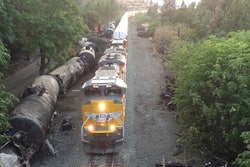WASHINGTON, July 13, 2016 — (USDA FSIS news release) — The U.S. Department of Agriculture’s (USDA) Food Safety and Inspection Service (FSIS) announced changes Wednesday to improve humane handling inspections at facilities that produce veal meat.
With this change, FSIS will begin to require that veal calves that are brought to slaughter but cannot rise and walk be promptly and humanely euthanized, and prohibited from entering the food supply. Previously, FSIS has allowed veal calves that are unable to rise from a recumbent position to be set aside and warmed or rested, and presented for slaughter if they regain the ability to walk. FSIS has found that this practice may contribute to the inhumane treatment of the veal calves. This change would improve compliance with the Humane Methods of Slaughter Act by encouraging improved treatment of veal calves, as well as improve inspection efficiency by allowing FSIS inspection program personnel to devote more time to activities related to food safety.
Additionally, after review and consideration of comments to the proposed rule, FSIS is amending the regulations by removing a provision that requires ante-mortem inspection to be conducted in pens. This final rule makes clear that FSIS inspectors have the authority to conduct ante-mortem inspection and condemn non-ambulatory disabled veal calves the moment they arrive on the premises of the establishment.
“FSIS is dedicated to ensuring that veal calves presented for slaughter at FSIS-inspected facilities are treated humanely,” said Deputy Under Secretary Al Almanza. “Prohibiting the slaughter of all non-ambulatory veal calves will continue this commitment and improve compliance with the Humane Methods of Slaughter Act.”
Since 2004, FSIS has prohibited the slaughter of non-ambulatory cattle for human food because the inability to rise may be a symptom of Bovine Spongiform Encephalopathy (BSE). While BSE is not a serious risk in cattle younger than 30 months of age, the regulations apply to all cattle, including veal calves. Currently, unlike adult cattle, veal calves that regain the ability to walk after being warmed or rested may enter the food supply. In 2013, FSIS granted a petition by the Humane Society of the United States asking the agency to remove this provision. This new rule will remove the provision, requiring that non-ambulatory calves be promptly and humanely euthanized, in keeping with requirements for adult cattle.






















